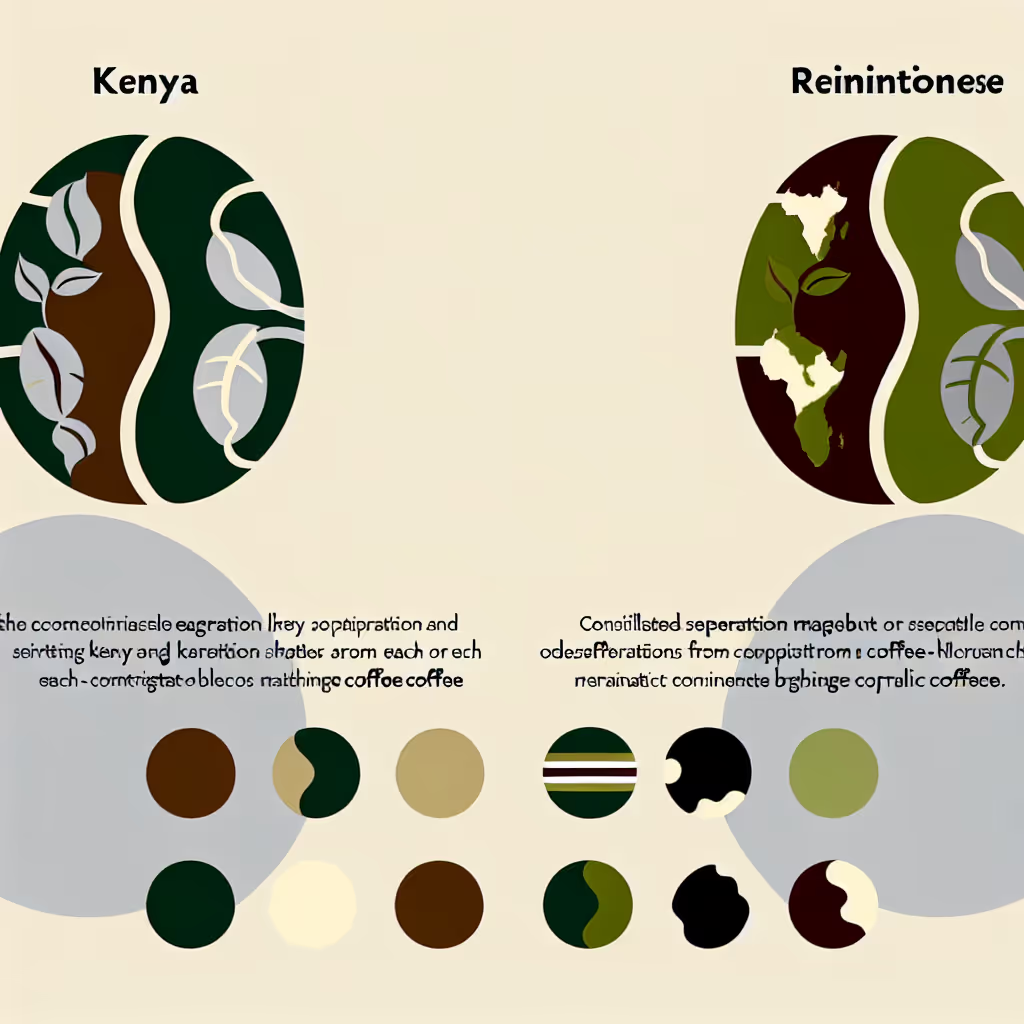Kenyan Vs. Congolese Coffee
This comparison explores the distinct qualities of Kenyan and Congolese coffee beans, highlighting their flavor profiles, growing conditions, and brewing methods to help coffee enthusiasts make informed choices.

Brief Description
Kenyan coffee is renowned for its bright acidity, full body, and complex flavor profile. Grown in the rich volcanic soils of the Central Highlands, these beans benefit from ideal climate conditions and meticulous processing. The result is a cup that's bold, wine-like, and often described as the 'connoisseur's choice'. With notes ranging from blackcurrant to citrus, Kenyan coffee offers a truly unique and memorable tasting experience.
Congolese coffee, grown in the lush highlands of the Kivu region, is a hidden gem in the world of specialty coffee. Known for its complex flavor profile and bright acidity, these beans offer a unique taste experience that reflects the rich biodiversity of the Congo. Despite facing challenges, the coffee industry in the DRC is experiencing a resurgence, with dedicated farmers producing high-quality beans that are gaining recognition in the international market.
Importance of Comparison
Comparing Kenyan and Congolese coffee is crucial for coffee lovers seeking to explore the diverse flavors of East African beans. These origins offer unique taste experiences, reflecting their distinct terroirs and processing methods. Understanding their differences helps consumers expand their palate, appreciate regional nuances, and make informed purchasing decisions in the specialty coffee market.
Key Attributes
Origin
Kenyan
Congolese


Consumer Guide
When choosing between Kenyan and Congolese coffee, consider your flavor preferences. Kenyan coffee is known for its bright acidity and wine-like qualities, with notes of blackcurrant and citrus. It's ideal for those who enjoy a bold, complex cup. Congolese coffee offers a more balanced profile with citrus, floral, and chocolate notes, appealing to those who prefer a smoother taste. Consider brewing methods: both excel in pour-over and French press, but Congolese beans are also great for espresso. Altitude and processing impact flavor, so look for Kenyan beans from 1400-2100m and Congolese from 1200-2200m. Kenyan coffee's double fermentation process enhances its unique profile, while Congolese beans offer variety with washed, natural, and honey processing options.
Expert Opinions
Coffee expert James Hoffmann notes, 'Kenyan coffee's brightness and complexity make it a standout in cupping sessions.' Specialty roaster Maria Rodriguez adds, 'Congolese beans are an exciting rediscovery, offering a perfect balance of acidity and sweetness.' Both agree that these origins represent the best of East African coffee, with Kenyan beans praised for their consistency and Congolese for their potential and unique terroir expression.
FAQs
Kenyan coffee is known for its bright acidity, full body, and complex flavors of blackcurrant and citrus. Congolese coffee offers a more balanced profile with citrus, floral, and chocolate notes. Kenyan beans tend to be bolder and more wine-like, while Congolese beans are often smoother with a unique terroir expression.
Kenyan coffee benefits from volcanic soils in the Central Highlands, grown at 1400-2100m altitude. This contributes to its bright acidity and complex flavor. Congolese coffee, grown in the Kivu region at 1200-2200m, reflects the area's rich biodiversity, resulting in a unique taste profile. The higher altitude of both regions contributes to the beans' high quality and distinct flavors.
Both Kenyan and Congolese coffees excel in pour-over and French press methods, which highlight their complex flavors. Kenyan beans are particularly good for cold brew, enhancing their fruity notes. Congolese beans perform well in espresso, offering a balanced shot with subtle sweetness. Experiment with different methods to find your preferred way of enjoying these unique origins.
Kenyan coffee often undergoes a unique double fermentation washed process, enhancing its bright acidity and complex flavors. Congolese coffee offers more variety, with washed, natural, and honey processing methods available. Washed Congolese beans highlight clarity and acidity, while natural and honey processes bring out more sweetness and body, offering diverse flavor experiences from the same origin.
Kenyan coffee is generally more widely available due to its established reputation in the specialty coffee market and higher annual production (50,000 metric tons). Congolese coffee (40,000 metric tons annually) is gaining recognition but may be less common. However, both can be found through specialty roasters and online retailers catering to coffee enthusiasts seeking unique East African beans.
Conclusion
Both Kenyan and Congolese coffees offer exceptional qualities that showcase the best of East African coffee production. Kenyan beans are the go-to for those seeking a bold, complex cup with bright acidity and wine-like qualities. Congolese beans appeal to those preferring a more balanced profile with subtle complexity. As the Congolese coffee industry continues to grow, it presents an exciting opportunity for coffee lovers to explore new flavors. Ultimately, the choice between these origins comes down to personal preference, brewing method, and desire for either a classic favorite (Kenya) or an emerging star (Congo) in the specialty coffee world.






